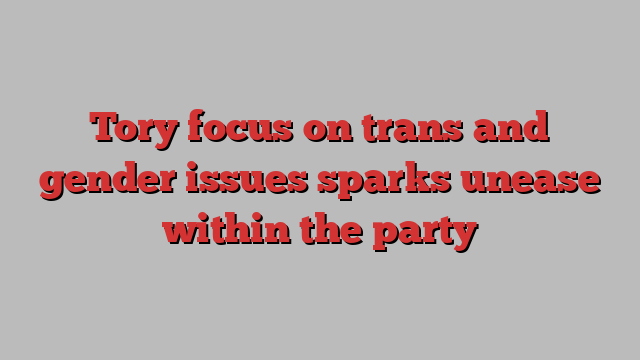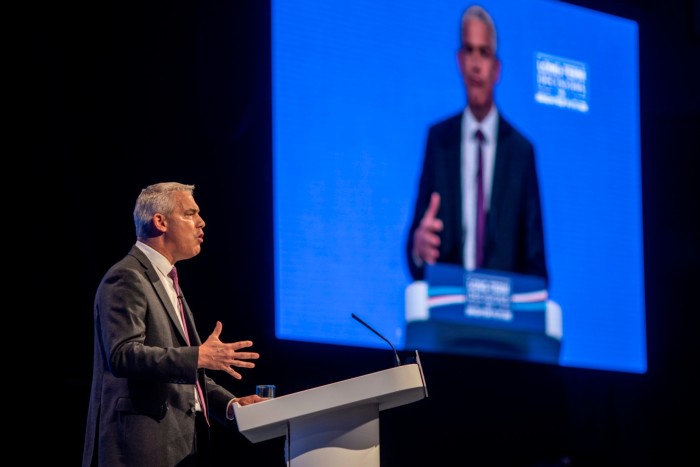
Receive free Gender politics updates
We’ll send you a myFT Daily Digest email rounding up the latest Gender politics news every morning.
Policies on gender and trans issues dominated announcements by ministers at the Conservatives’ conference on Tuesday, sparking a backlash among Tory MPs anxious about the party’s deepening politicisation of the subject.
Six cabinet ministers used their moment at the podium to draw attention to trans and gender issues, with some frontbenchers promising fresh moves, reviews or guidance.
The prevalence of the subject on the main agenda at the four-day party conference in Manchester signals that the topic is likely to be a prominent theme in the Tories’ campaign in the election expected next year.
Lee Anderson, the Tory MP who is also deputy chair of the party, said in February that with Brexit off the agenda the party needed to find new topics to galvanise the electorate, namely the “trans debate” and “culture wars”.
The Conservatives are framing their position as the “common sense” stance on women and children’s rights, contrasting it with Labour, which they accuse of cleaving to an extremist gender ideology.
However, the heavy emphasis on the subject leaves the party open to criticism that it is stoking divisive, US-style “culture wars” in pursuit of electoral gains.
Tory ministers are among those concerned the issue could cast the party in an hostile light and warned it could prove a “distraction” from measures to help voters such as with the cost of living.
One stressed the party should be “compassionate” in its approach to trans people, adding: “It’s not an issue that voters notice like pump watch [a scheme to monitor and compare petrol prices], it doesn’t come up on the doorstep.”
Suella Braverman, the home secretary, on Tuesday used her speech to rail against “gender ideology” as a “woke” and “highly controversial” thesis that has been presented to the public as a “motherhood and apple pie” idea.
She announced a lifetime ban on sex offenders changing their gender, or name, in an attempt to prevent them from evading the sex offence register.
The speech prompted an angry reaction from Tory London Assembly member Andrew Boff, who was ejected from the auditorium for heckling Braverman.
“I’m a loyal Tory,” he told journalists afterwards, adding: “This trash about gender ideology is making our Conservative party look transphobic and homophobic. This is not what our Conservative party is about.”
Grace, a 16-year-old politics student who declined to give her surname, was visibly shaken by Braverman’s speech. “The villainisation of trans women in particular really upsets me,” she said as she left the hall.
Warning the party was out of step with her generation, she added: “People our age would be really disgusted by the things they’re saying.”

Earlier Steve Barclay, the health secretary, announced the government would change the NHS constitution to “recognise the importance of different biological needs and protect the rights of women”. The move, which will be put to consultation later this year, is expected to involve a ban on transgender women in female-only hospital wards.
Barclay also drew attention to his intervention to restore the word “women” on NHS web pages about female-specific illnesses such as cervical cancer, where such references had been “erased”.
In an oblique swipe at Labour leader Sir Keir Starmer, who has said individuals with male genitalia can be women, the health secretary was applauded when he told activists: “As Conservatives, we know what a woman is.”
Following criticism that it lacked a clear stance on gender self-identification, Labour in July said it was right to require a doctor’s opinion in order to legally change gender. The party also said it supported the existence of women-only spaces reserved for biological women, in certain contexts, in line with current equalities law.
Michelle Donelan, the science secretary, also lashed out at the “slow creep of wokeism”, as she announced a review into the use of sex and gender questions in scientific research and statistics, including in public bodies. It will produce “robust guidance” within six months, she said, after outlining concerns about “bureaucrats” banning “legitimate” research questions about biological sex.
On Monday Kemi Badenoch, the business secretary, and Alister Jack, the Scottish secretary, had both highlighted the UK government’s intervention in Scotland in January, when it blocked Holyrood’s attempt to introduce a gender self-recognition law.
But one minister urged caution over the issue. “We are on the right side of public opinion on this but there’s a danger of overkill,” they said.
A Tory strategist added it was important to avoid “lazy” or “intolerant” generalisations: “We have to be careful — we can’t let the impression take hold that we are the nasty party.”